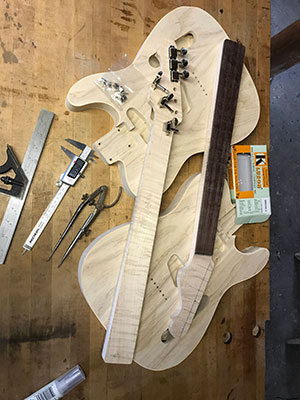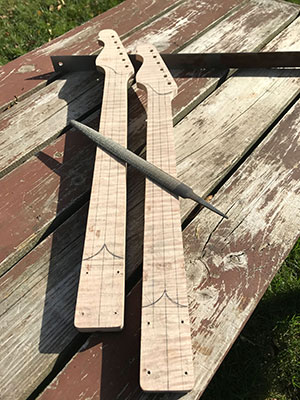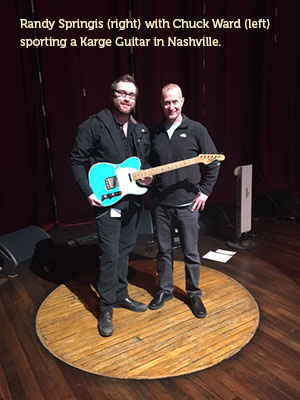Our Story
The back story of Karge Guitars (that’s Kar-gee, with a hard “g”) traces to Blue Earth, Minnesota, a farming town about 9 miles north of the Iowa border.

 It was there that Randy Springis grew up learning about taking pride in your work, never cutting corners, and the value of a job well done from his maternal grandfather, Harry Karge. Harry lived an honest and uncomplicated life, relying on his self-sufficiency and his tools to work the land and provide for his family. More often than not, his tool of choice was a team of mules.
It was there that Randy Springis grew up learning about taking pride in your work, never cutting corners, and the value of a job well done from his maternal grandfather, Harry Karge. Harry lived an honest and uncomplicated life, relying on his self-sufficiency and his tools to work the land and provide for his family. More often than not, his tool of choice was a team of mules.
That’s how Randy learned at a young age that mules are not so much stubborn as intelligent, steadfast, and reliable—the same qualities he observed in his grandfather. He also learned as a young boy on the farm the lesson that if you take care of your tools and use them in the right way, they’ll make the day’s work easier and more productive.
 Fast forward a decade, when Randy joined the Marine Corps at 18, completing two tours in the Persian Gulf, including Desert Storm, and had the real-life experience of learning how tools and other instruments used properly can make the difference between life and death.
Fast forward a decade, when Randy joined the Marine Corps at 18, completing two tours in the Persian Gulf, including Desert Storm, and had the real-life experience of learning how tools and other instruments used properly can make the difference between life and death.
It was during his time in the Service that Randy picked up his first guitar. “There’s something about a guitar in your hands when you play that E chord,” he says—“the emotions that can come from that. Just the power, the freedom, the exhilaration of playing….”
After discharge, Randy attended Boston’s famed North Bennet Street School for artisan trades and fine craftsmanship in its furniture and cabinet-making program. Upon graduation, he opened his own furniture and cabinet shop and to this day continues to run the shop by word of mouth only.
 The bulk of his work has been period furniture reproduction. Randy has spent countless hours studying and recreating the masters’ work of the past. What he has found is that there was once a high level of execution of overall design and aesthetics—no compromise in materials used or craftsmanship employed. The subtle undulations of a curve, the faintest bit of a tool mark, the obvious handmade labor of love—all of these added up to the subtle differences between two pieces of furniture that at a casual glance appeared to look the same but had measurable differences.
The bulk of his work has been period furniture reproduction. Randy has spent countless hours studying and recreating the masters’ work of the past. What he has found is that there was once a high level of execution of overall design and aesthetics—no compromise in materials used or craftsmanship employed. The subtle undulations of a curve, the faintest bit of a tool mark, the obvious handmade labor of love—all of these added up to the subtle differences between two pieces of furniture that at a casual glance appeared to look the same but had measurable differences.
Applying this knowledge and experience, Randy observed that many of today’s guitars lacked life and soul. There’s no difference from one to the next—no subtle undulations, no whispers of a tool mark, no uniqueness that a guitarist could tap into to bring out the best of themselves.

That’s why he took his experience, his knowledge, his enthusiasm, and his tools and crafted the first Karge guitar. He realized from there that he could make artisan guitars to meet any musician’s specific needs and expectations.
 “You go to a big box guitar store or even a small corner shop, and you can’t dictate what you want,” he says. I like to work with players to build them the guitar they really desire. I shape the neck and body by hand, slowly, over a period of days, which allows the wood ‘room’ to move and react, in turn letting me create an instrument that sounds and feels right in someone’s hands. The guitar is easier to play longer, without fatigue.
“You go to a big box guitar store or even a small corner shop, and you can’t dictate what you want,” he says. I like to work with players to build them the guitar they really desire. I shape the neck and body by hand, slowly, over a period of days, which allows the wood ‘room’ to move and react, in turn letting me create an instrument that sounds and feels right in someone’s hands. The guitar is easier to play longer, without fatigue.
“It’s a great time to be a boutique guy in the guitar industry,” Randy says. “People are rebelling. They’re tired of paying $2,000 to get a mass-produced guitar that doesn’t do what they need. For a little more money, they can get something custom made to satisfy their own unique playing style and aesthetic—a curly maple neck shaft, for instance, maybe Brazilian rosewood for the fret board—that will really give back to them for many years.”
His customers agree. Whether Nashville, rock, Indie artists, playing the blues, or reggae musicians, they’re coming to him for a Karge, for a guitar that’s going to do what they want, stay in tune, look good and feel right, play like a dream, and only get better over time.
